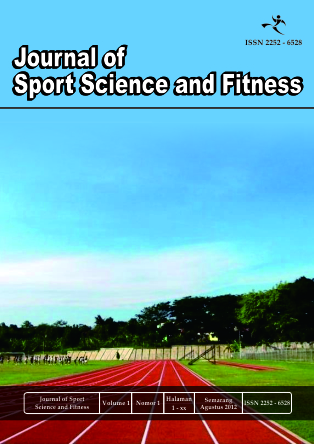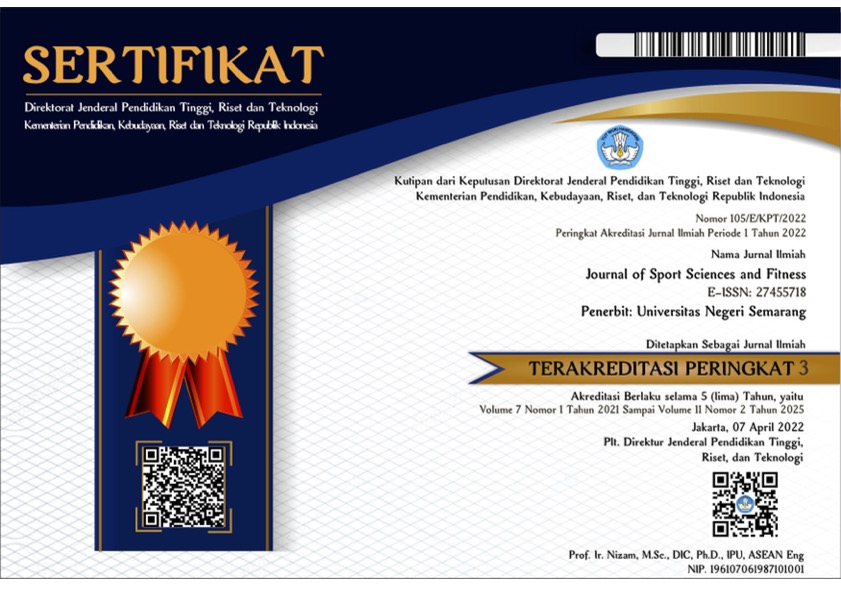PENGARUH VISKOSITAS AIR KOLAM RENANG TERHADAP KECEPATAN RENANG GAYA CRAWL
Abstract
Tujuan: Untuk mengetahui perbedaan kecepatan renang gaya crawl pada viskositas yang berbeda serta pengaruh viskositas terhadap kecepatan renang gaya crawl. Metode: Penelitian ini menggunakan pendekatan kuantitatif dengan metode survey yang bersifat analitik dalam bentuk potong silang. Sampel dalam penelitian ini adalah 30 perenang dari Jurusan Ilmu Keolahragaan dan air kolam renang Jatidiri.Teknik sampel yang digunakan dalam penelitian ini adalah purposive technique sampling dan random sampling. Hasil: Adanya perbedaan kecepatan renang gaya crawl pada perbedaan viskositas sebesar 0,188537 N·s/m2 dengan probabilitas 0,025 (<0,05), sedangkan pada perbedaan viskositas sebesar 0,163497 N·s/m2 dengan probabilitas 0,263 (>0,05) tidak ada perbedaan. Viskositas berpengaruh terhadap kecepatan renang gaya crawldengan probabolitas 0,017 (<0,05).Pengaruh viskositassebesar 7,8% dan rumus prediksi yang didapat adalah y=1,352-0,598x. Simpulan: Ada perbedaan kecepatan renang gaya crawl pada perbedaan viskositas yang signifikan dan tidak ada perbedaan kecepatan renang gaya crawl pada perbedaan viskositas yang tidak signifikan, serta ada pengaruh viskositas air kolam renang terhadap waktu tempuh renang gaya crawl.
Purpose: To know the difference of crawl stroke’s speed in the different viscosity and the influence of viscosity toward speed of crawl stroke. Methods: An analytic survey-based method in cross sectional form by using a quantitative approach was used in this study. The sample in this study is 30 swimmers from students of sport science departement and 1liter ofswimming pool water. The sampling technique used in this study is purposive technique sampling and random sampling system. Results: The results showed that there are the difference of crawl stroke’s speed in the viscosity in 0,188537 N•s/m2 difference with 0,025 probability (<0,05), in the other hand in 0,163497 N•s/m2 difference with 0,263 probability (>0,05) there is no difference. The viscosity influential toward crawl stroke’s speed with 0,017 probability (<0,05). The influence of viscosity is 7,8% and the prediction formula from analysis regression linear is y=1,352-0,598x. Conclusion: There is the difference of crawl style swimming speed on the significant different viscosity and there is no the difference of crawl style swimming speed on the different viscosity that not significant, and there is the influence of viscosity toward crawl style swimming speed.
References
Hamill, J., dan K. M. Knutzen. 2003. Biomechanical basis of human movement (2nd Ed). Washington: Lippincott Williams & Wilkins
Karnadi, Indik dan Sumarno. 2009. Renang. Jakarta: Universitas Terbuka
Mollendorf, J. C., Termin, A. C., Oppenheim, E. dan Pendergast, D. R.. 2004. Effect of Swim Suit Design on Passive Drag. American College of Sports Medicine. 0195-9131/04/3606-1029, 2004: 1029-1035
Munson, B. R., Young, D. F. dan Okiishi, T. H.. 2002. Mekanika Fluida Vol. 1 (4th Ed). 2004. Terjemahan Harinaldi dan Budiarso. Jakarta: Erlangga
Notoatmodjo, Soekidjo. 2010. Metode Penelitian Kesehatan. Jakarta: Rineka Cipta
Streeter, V. L., dan Wylie, E. B. 1985. Mekanika Fluida Vol. 1 (8th Ed). Terjemahan Arko Prijono. Jakarta: Erlangga
Tipler, Paul A., dan Mosca, Gene. 2004. Physics for scientists and engineers Extended (5 th Ed).New York: W. H. Freernan and Company
Wang, Q. 2004. Breakthroughs in the Water (The Science of Swimming). Available at http://ysm.research.yale.edu/article.jsp?articleID=291&printable=1. (accesed 26/09/13)
Warsito, Sri W. S. dan Dyan I.. 2012. Desain dan Analisis Pengukuran Viskositas dengan Metode Bola Jatuh Berbasis Sensor Optocoupler dan Sistem Akuisisinya pada Komputer. Jurnal Natur Indonesia. 14 (3); 230-235








